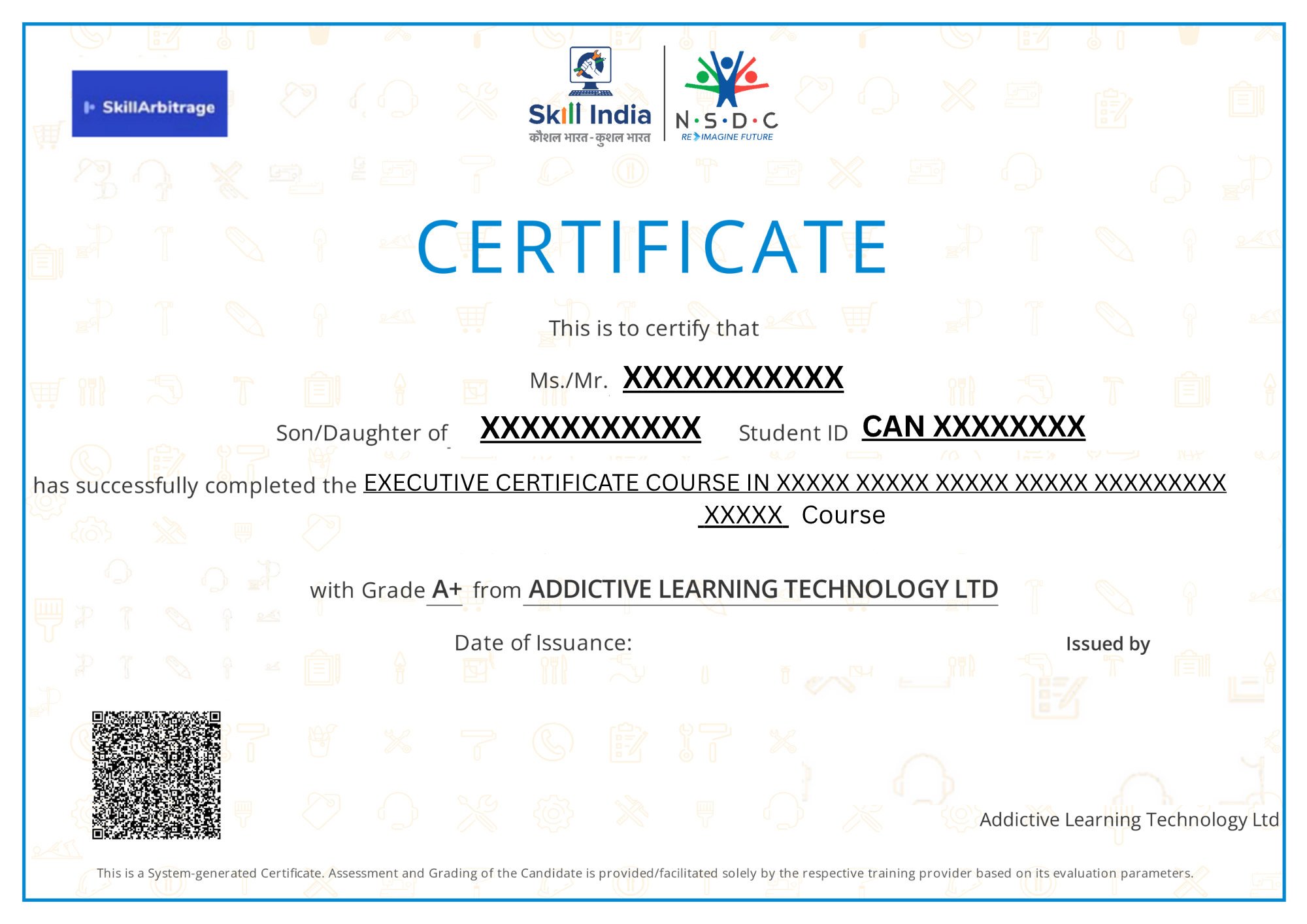 Duration - 6 Month, 8-10 hours/week
Duration - 6 Month, 8-10 hours/week
 Course fee: - INR 63000
Course fee: - INR 63000
Key Highlights

Comprehensive Curriculum: Covering all major aspects of compliance including legal, ethical, and regulatory frameworks.

Practical Application: Real-world case studies, interactive sessions, and practical exercises to apply your knowledge.

Certification: Earn a recognized certification to boost your credentials and advance your career.

Emerging Trends: Staying updated with the latest trends and changes in U.S. corporate compliance.

Flexible Learning: Online modules that you can complete at your own pace.

Career Advancement: Equip yourself with the skills and knowledge to excel in your role and advance your career.

Interactive Content: Engaging videos, quizzes, and discussion forums to enhance learning.
Who should take this course?
- Commerce, accounting, finance, economics or taxation students who are still in college looking for an extra source of income
- Graduates or experienced professionals from commerce background (BCom/ MCom) looking for a remote job option without leaving the comfort of home or who are forced to work from home, but has access to a computer and stable internet connection
- Any graduate or experienced professional earning less than 1 lakh per month who wants to earn more
- Even chartered accountants / company secretaries who are looking for jobs / clients or who intend to advise Silicon Valley startups, foreign corporations which intend to establish presence in the US or multinational companies, or international expansion of their current employer or Indian clients can take it up
What will you learn from this course?
- You will learn how to perform entity incorporation, conversion, winding up, investment and joint venture contracts, general corporate contracts, ESOPs, corporate governance, record-keeping around financial transactions and mortgages, everyday compliance under corporate and securities laws, which is of high relevance for clients when they engage remote freelancers. You will also learn about tools such as CARTA.
- The tasks covered will be pursuant to various federal securities laws and various state corporate laws in the US.
- By learning how to perform these tasks, you will learn to remotely cater to legal departments of US corporations, US tech startups and US law firms and lawyers.
- You will also learn how to develop your outreach by creating profiles on different freelancing platforms and develop the ability to write effective proposals.
Who will be your potential employers or clients
- Entrepreneurs in the US or outside looking to incorporate entities in the US, convert business structure from one form to another, wind down business, manage everyday record-keeping and compliance, or make other standard changes;
- US corporate law firms and solo practitioners who want to stay competitive and offer more cost-effective solutions for their clients
- Corporate legal departments in the US which need assistance of remote paralegals for regular corporate filings and maintain records;
- Registered agents in the US providing usual incorporation and filing services and CPA firms
What is unique about this course?
- This course aims to impart a wide range of corporate law and compliance skills to the participants, which would enable them to take up remote freelance work on US corporate law directly or through various freelancing websites on the internet and will instill in them the required confidence to generate global clientele over the internet.
- We will also guide you in developing your online presence as a Corporate Law Paralegal through various freelancing platforms such as Upwork, Fiverr, People Per Hour, etc. and through social media networks such as Linked In, Facebook, etc.
- By the end of this course, you can expect to have secured enough skills to be able to take up paralegal work assignments from small and medium sized companies in the US as well as law firms / CPA firms in the US looking to outsource work.
- You will also be equipped to help small entrepreneurs outside the US establish a presence in the US by incorporating entities.
- The course is tough and intensive, you will not be awarded the certificate unless you complete the required number of assignments. You will have to invest 4-5 hours per week in developing your skills, in addition to the classes on this course.
- You will have interactive classes with high-quality discussions which will be taken by the experts of this course. You can get all the doubts resolved in the classes or even outside the classes through course groups and email.
- You will get personal attention and coaching from our trainers who will be assigned to you, and have access to a dedicated course anchor who will help you with submissions or any guidance or issues you may have as you progress through the course.
- You will receive in-line feedback for the assignments you submit, which will improve your performance to a significant extent.
- You will have access to other doubt clearing mechanisms also, in addition to the online classes such as a discussion forum where queries are responded to within a period of 48 hours.
- You will be trained in writing for six writing assignments during the term of the course and if these are of publishable quality, these shall be published on the iPleaders blog which sees a footfall of more than a million visitors a month.
Specific learning objectives
- You will learn about the American legal system and court structure to be able to use it in guiding clients
- You will learn how to find the Corporations Code or the Corporations Laws of different states in the US
- You will learn who the different corporate sector regulators are in the US
- You will learn to distinguish between different types of business entities in the US and learn how to identify the right form of entity for a specific purpose
- You will learn which forms of entities are most commonly used in the US
- You will learn how to choose the right state to incorporate an entity in the US if you are a non-resident
- You will learn how to incorporate a US entity in the states of Delaware, California, New York, Texas and Florida
- You will learn how to convert a Limited Liability Company (LLC) to a Corporation
- You will learn how to convert one type of corporation into another
- You will learn how to change the state in which your business is operating in the US
- You will learn about which are the basic registrations required after incorporating an entity in the US and how to secure these registrations
- You will learn about the different types of officers appointed in a US entity and what their roles and responsibilities are
- You will also learn about the eligibility requirements to be appointed to these officer positions and the manner of appointment
- You will learn about the available decision making levels in a US entity
- You will also learn how the Directors or officers of a US entity can resign and what formalities need to be completed for their resignation
- You will also learn how the Directors of a US entity can be removed and what formalities are required to be completed for their removal
- You will learn about the different types of securities commonly used by US entities and the procedure for their issuance
- You will learn about different types of share transactions such as buyback, transfers, splits etc. and the procedure for completing these transactions
- You will learn about the compliance and record keeping requirements in relation to share issuances and other transactions as well as the movements in the capital of the company
- You will learn the formalities required to be completed by an issuer of securities under the Blue Sky regime
- You will learn about the different ways in which US entities can raise debt
- You will learn about how US entities can issue debt securities
- You will also learn about how US entities can give and take inter-corporate loans
- You will learn about different types of investors and the stages in the investment process
- You will learn about the various incentives available for investment in different US states and how you can avail these incentives
- You will learn how you can support Indian entrepreneurs in executing a Delaware flip.
- You will learn about different types of merger and acquisition transactions
- You will learn about the merger process and how to support law firms and help companies with drafting an agreement of merger
- You will learn about the US Bankruptcy process and how to support law firms engaged in providing bankruptcy related services to companies
- You will learn about how US Companies can list on NYSE and NASDAQ stock exchanges
- You will learn the methods of takeover of a US entity and also how to draft documents in relation to the takeover process
- You will learn how to ensure compliance with US laws in relation to corporate governance
- You will learn about the annual compliance requirements for a US company
- You will learn about the different types of corporate litigation in a company and how you can support law firms handling such litigation cases
List of skills you will learn through weekly exercises
- How to brief a client about the legal systems in the US and the US corporate regulators
- How to advise a client on the best structure from the available structures or forms of business
- How to advise a client on the best US state to incorporate based on the business
- How to form a Limited Liability Company in Delaware, California, New York, Nevada and Wyoming;
- How to incorporate a Corporation in Delaware, California, New York, Nevada and Wyoming;
- How to convert from other forms of business entities to a Limited Liability Company
- How to convert from other forms of business entities to a Corporation
- How to draft Partnership Agreements for a GP, LP, LLP
- How to draft operating agreement for an LLC
- How to draft by-laws for a C-Corporation
- How to elect to become an S-Corporation
- How to close business in one state and commence operations in another state
- How to get an individual tax identification number and an employer identification number
- How to appoint directors and officers in a Limited Liability Company as well as a Corporation
- How to carry out the appropriate procedure for resignation and removal of directors and officers in a US corporation
- How to help with the implementation of different policies in a US corporation
- How to help with the contract management process i.e. review of contracts and ensuring execution and legalisation - notary and apostille
- How to work with contract management databases
- How to prepare Annual Reports / Annual Statements of Information for US entities
- How to help with the filing and record keeping work in relation to the issue of shares
- How to assist in the administration of a stock option scheme
- How to format, redline and assist with the execution of term sheets and other transaction documents such as share purchase agreements, share subscription agreements and investor rights agreements
- How to ensure compliance with Blue Sky regulations
- How to assist with other types of share transactions such as share buybacks, share splits etc.
- How to assist with completing records of borrowings and execute debt related agreements
- How to draft board and shareholder resolutions and unanimous written consents, convening committee, board and shareholder meetings
- How to assist investors in availing investor tax credit
- How to assist with drafting a plan of merger and convening of shareholders meetings and drafting resolutions for approval of merger
- How to help non-US entities in establishing a presence in the US and guiding them on the ongoing formalities
- How to help with convening meetings of shareholders in the event of a corporation going for insolvency
- How to help a foreign law firm advising a US entity on listing procedures
- How to help with ensuring AML / FINRA compliance and insider trading related compliance
- How to help a foreign law firm advising a US entity on takeover / acquisition of shares, preparation of bear hug letters etc.
- How to help a law firm with different types of corporate litigation
- How to create your profile on various freelancing platforms and submit proposals for projects
Training Methodology

24/7 online access to all materials - study at your convenience
Access to basic study material through online learning management system, Android and iOS app. Recordings of all classroom sessions will be available.

Hard copy study material covering important chapters
Hard copy study material modules to be couriered to your address in India.

Practical Exercises
2 practical exercises every week, followed by written feedback.

Live Online Classes to Teach Specific Work
There will be a live video-based online class to teach you specific US corporate law work performed by paralegals. You can ask questions, share your screen, get personal feedback in this class. Every week there will be approx. 1-1.5 hours of class to teach you the work and give you feedback. There will be recordings available in case you miss a class.

Convenient Class timings
Classes are held after regular work hours. Typically classes are kept on Sundays or 8-9 pm on other days.

Live Doubt Clearing
You can ask questions in class, or on the learning management system when you read a chapter. You can also schedule a one-on-one session with evaluators to perform exercises or write articles.
Certification
This course is recognized by the National Skill Development Corporation, a PPP under the Ministry of Skill Development and Entrepreneurship of the Government of India. You will receive a certificate cobranded by NSDC and Skill India on successful completion.
This is how the certificate from NSDC and Skill India will look as per the current applicable format (may change as per the approval authorities):

Money-back guarantee
If you take this course, follow it diligently for a month, do all the exercises but still do not find value in it, or not able to understand or follow it or not find it good for any reason, we will refund the entire course fee to you. It is a 100% money-back guarantee with only one condition, you must pursue it properly for a month. If you don’t find it valuable after that, get your entire money back.
Client Opportunities & Recruitment Support where required
- Many employers, law firms and companies are happy to recruit our high performing students. If you do well in your exercises and classes, we can help you to get jobs, internships and assessment internships in good law firms, with renowned lawyers as well as in various companies.
- Our team helps our students in building their profile on LinkedIn and freelancing platforms to increase their reach to the potential recruiters or clients.
- Our experts guide the students on how to crack any interview.
- On-demand, we provide mock interviews for our students looking for jobs.
- We help our students to get internships not only at law firms and chambers, but also with rising startups in diverse sectors.
- Our mentorship helps students to avoid running in the rat race behind the regular job openings; rather we help them design their own path based on their personal interests.
- We share multiple and diverse client opportunities with our pool of practicing advocates on a daily basis. Our references have helped several advocates really scale up their practice.
- We have a freelancing team which helps you develop your profile on Upwork and Fiverr and also guide you on sending proposals for various jobs on these platforms.
- We have an Upwork agency where, if you have diligently completed your assignments in the course, you stand a chance to work on actual client assignments under the guidance of a Co-founder and earn money while working on those assignments.
Online Faculty and Guest Faculty
Syllabus
The American Legal System and Corporate Sector from a compliance perspective 
![]() What you need to know about US Law for performing compliance work
What you need to know about US Law for performing compliance work
Constitution
Legislation - Acts, Rules, Regulations,
Case law
Common law
Contract law
How to find the Corporations Codes of different States
- Model Business Corporation Act
Securities laws
- Securities Act, 1933
- Securities and Exchange Act, 1934
- Sarbanes Oxley Act, 2002
- Dodd-Frank Wall Street Reform and Consumer Protection Act
- Jumpstart Our Business Startups Act
![]() US Court system and hierarchy of courts at federal and state level
US Court system and hierarchy of courts at federal and state level
US Federal Court System
US State Court System
District Courts, Trial Courts and Courts of Appeals
The US Supreme Court
The Jury System
The US Department of Justice
The Attorneys General
![]() Who are the Corporate Sector regulators in the US and how do they work?
Who are the Corporate Sector regulators in the US and how do they work?
US Federal Trade Commission
Internal Revenue Service
Securities and Exchange Commission
Secretaries of States
- Division of Corporations of Relevant States
Registering an entity in the US and Conversions 
![]() How to choose the right form of business organization
How to choose the right form of business organization
Which forms enable limited liability and perpetuity of existence
What are the factors to consider while choosing the right form
- LP
- GP
- LLP
- LLC
- C-Corporation
- S-Corporation
- Non-stock corporations
What are publicly held corporations?
How to choose the right state for forming a company if you are a non-resident
Entity types depending upon sectors
- Mutual Water Companies
- Wasting Asset Corporations
![]() How to register a corporate entity
How to register a corporate entity
LLCs, C-Corporations, S-Corporations
Requirement to hire a registered agent
Reserving a name
Submitting incorporation documents
Which officers do you need to identify
What are the constitution documents and how to draft them
- Partnership Agreement for an LP
- Statement of Partnership Existence
- LLP Agreement
- Operating Agreement
- Articles of incorporation / organisation
- By-laws
Obtaining EINs, foreign qualifications and DBA certificates
Templates:
Partnership Agreement for an LP
Certificate of Limited Partnership
Statement of Partnership Existence
LLP Agreement
Operating Agreement
Articles of incorporation / organisation
Certificate of Incorporation
By-laws of a C-Corporation
By-laws of an S-Corporation
By-laws of a Non-Stock Corporation
![]() Conversions of forms of business entities and change of states
Conversions of forms of business entities and change of states
How to convert from an LLC to a corporation
How to convert from one type of corporation to another
Can you change the state of an LLC from one state to another? How?
Templates:
Plan of conversion
Board / Stockholder Resolutions / Unanimous consents for approving the plan of conversion
![]() Basic registrations, formalities and approvals required after registering an entity
Basic registrations, formalities and approvals required after registering an entity
Getting Federal Tax ID for company
Getting individual tax id
Opening a banking account
Getting a certificate of good standing
Prepare certificates of incumbency and signature authority as requested by banks, customers and other outside third parties
Working with Secretaries of States, Divisions of Corporations, Corporation Commissions and similar agencies
Templates:
Form SS-4 - For securing the EIN of an entity
Certificate of incumbency
![]() Overview of Taxation
Overview of Taxation
Taxation of different business structures
Pass through taxation
Personal taxation of founders
Slabs
Types of taxes - federal and state
How are central and local taxes paid
How to file tax returns
What to do if your entity is forfeited by the FTB in California
Officers, decision making and governance in US companies 
![]() Typical officer positions in a US company and modes of appointment
Typical officer positions in a US company and modes of appointment
Board of directors
Committees
President
Vice President
Secretary
Treasurer
CEO
Female directors
Directors from underrepresented communities
Provisional Directors
Eligibility criteria
Modes of appointment
![]() Decision making mechanisms in different types of entities
Decision making mechanisms in different types of entities
Meetings of the board of directors
Modes of convening and holding meetings
How are decisions taken at board meetings
Interested directors
Deadlocks
Annual Shareholders / Stockholders meetings and decisions at such meetings
Proxy voting
Filing and record-keeping requirements
How to prepare PoAs and proxy documents
How to prepare committee, board and shareholder resolutions, maintain minutes and unanimous consents
![]() Liabilities and powers of directors and officers
Liabilities and powers of directors and officers
Liabilities in terms of corporations codes
Liabilities in terms of other statutes
Directors’ liability insurance in the US
![]() Resignation and removal of directors and officers
Resignation and removal of directors and officers
Resignation
- Can a resignation be irrevocable?
- How to draft clauses in the by-laws relating to resignation of Directors
- How can officers resign?
- Filing and record keeping requirements in relation to resignation
Removal
- Removal of Directors in case of classified boards
- Can an entire board be removed?
- Filing and record keeping requirements in relation to removal
![]() Corporate governance in listed and unlisted entities
Corporate governance in listed and unlisted entities
Who are the stakeholders in a corporate entity?
Which laws contain provisions relating to corporate governance?
- Federal and State Corporate Laws
- Securities Exchange Act
- Sarbanes Oxley Act
- Dodd-Frank Wall Street Reform Act
- Listing Rules
- Third Party Best Practice Guidelines
Assist with implementing and maintaining compliance related policies and processes, including supporting policy trainings
Corporate day-to-day responsibilities including scheduling, note-taking, and project management (maintaining several legal task dockets).
Liaising with marketplace and business development teams to compile shareholder documentation for review; reviewing and summarizing shareholder documentation to inform trade structure.
![]() Contract and records management
Contract and records management
Serving as a contact point for various types of agreements and contracts
Overseeing the signature process, execution and legalisation of contracts, ensuring apostille and authentication where required
How to work with contract databases
How to manage databases for multiple entities around the world - Global entity management system (GEMS)
![]() Annual compliance requirements
Annual compliance requirements
Prepare government filings for US and non-US subsidiaries, including acting as a key contact in the preparation and filing of annual US state reports.
Annual Statement of Information
Franchise Tax filing
Changes in capital, share transactions and borrowing transactions 
![]() Types of securities and changes in capital
Types of securities and changes in capital
Classes or series of shares and stock and how to issue shares of different classes
- Qualified Small Business Stock (QSBS)
- Preference Shares
- Redeemable shares
- Convertible shares
- Fractional shares
- Share Options
- Restricted Stock Units (RSUs)
Compliance and record keeping requirements for issue of shares
Share option administration using software
Variations in rights of holders of different classes of stock
What is a capitalisation table and how to create and maintain one
“Fully diluted basis” shareholding
Increasing authorised shares
Sub-division of capital
Dividends
Convertible Note investments
How to draft a Simple Agreement for Future Equity (SAFE)
Formatting, redlining and finalizing transaction documents including transfer notices and share transfer agreements; maintaining legal document templates folder and updating document templates as necessary.
Blue Sky Filing Regime
- Registration requirements under federal and state laws
- Private placement exemption under Rule 506(b)
- Private placement memorandum and other disclosures
![]() Share transactions
Share transactions
Commercial transactions involving share issuances: ESOPs, investments, M&A, exits, buyouts, etc.
Issue of shares or stock
Share transfers
Share splits
Share or stock consolidation
Share buybacks
Compliance and record keeping work for share transactions
Maintaining shareholder lists
Uniform Electronic Transactions Act and paper equivalent stock certificates
![]() Borrowing transactions and issue of debt securities
Borrowing transactions and issue of debt securities
Borrowing powers of a corporate entity
Issue of debt securities
Provision of security for borrowing
Basic security documents and how to read and keep a record of them
Inter-corporate loans
Filings and record-keeping requirements
Funding methods and investment process 
![]() Types of investors
Types of investors
Strategic vs. Financial investors
Angel investors
Private Equity investors
Venture Capital investors
Who are impact investors?
![]() The investment process
The investment process
Stages in the investment process from pitch to receipt of funding
Decision to invest and due diligence
Finalisation of deal structure, deal terms
Term Sheet
Closing and execution of transaction documents
- Share Subscription Agreements
- Share Purchase Agreements
- Shareholders Agreements / Investors Rights Agreements
NVCA model legal documents
Decision-making post investment
Convertible notes
SAFEs (Simple Agreement for Future Equity)
Information covenants, board advice by the investors, introduction to networks etc.
Mechanics of VC and/or PE investment transactions and their closings
- preparation of stock certificates and ledgers (including use of Carta or similar web-based equity tracking system),
- assist in assembling and preparing legal opinion, backup materials,
- assist in preparation and filing of Reg D and state Blue Sky securities filings,
- general coordination of closing mechanics.
![]() Incentives for investment in different states
Incentives for investment in different states
Jumpstart Our Business Startups Act (JOBS Act)
- Emerging growth companies
- Exemptions for small companies
Delaware Angel Investor Tax Credit
![]() Investment in Indian owned US entities and the Delaware Flip
Investment in Indian owned US entities and the Delaware Flip
What is the Delaware flip?
When is the Delaware flip used?
How is a Delaware flip executed?
Can there be any issues which arise in this process?
Mergers and acquisitions 
![]() Different types of M&A transactions
Different types of M&A transactions
Merger of parent corporations and subsidiaries
Merger of domestic corporations
Merger of domestic and foreign corporations
Merger of domestic corporation and other associations
Consolidations
Exchanges of interest
Sale of Assets
![]() The merger process
The merger process
Agreement of merger or consolidation / Plan of merger
Amendment to any such agreement
Certificate of merger or consolidation
Approval by the stockholders
Share exchange
Amending the required certificates of incorporation
Mechanics of M&A transactions and their closings,
- organizing and creating inventory of due diligence documentation (including navigating virtual due diligence/data rooms),
- assistance preparing disclosure schedules,
- manage and coordinate closing deliveries (including preparing and maintaining closing checklists,
- coordinating notarized signatures, coordinating with other legal assistants and attorneys,
- preparing and assembling closing certificates and signature pages),
- preparing electronic closing binders.
Foreign Corporations 
![]() Requirements for companies incorporated outside US establish presence and undertake business activity in the US - obtaining a foreign qualification
Requirements for companies incorporated outside US establish presence and undertake business activity in the US - obtaining a foreign qualification
![]() Requirements and filings for US companies incorporated outside the state to undertake business activity in the state
Requirements and filings for US companies incorporated outside the state to undertake business activity in the state
![]() Filing certificate of incorporation and details of registered agent as well as officers with the Secretary of State
Filing certificate of incorporation and details of registered agent as well as officers with the Secretary of State
![]() Notification requirements for changes in constitution, management, etc.
Notification requirements for changes in constitution, management, etc.
![]() How can foreign corporations withdraw from the state?
How can foreign corporations withdraw from the state?
US Bankruptcy and insolvency 
![]() The US Bankruptcy code (Title 11, USC)
The US Bankruptcy code (Title 11, USC)
Voluntary Bankruptcy - filing by the debtor
Involuntary bankruptcy
Joint cases
Appointment of Trustee
Administration of bankruptcy
- Meetings of equity shareholders
- Filing of proof or claim of interest
- Waterfall - determining secured interests, tax liability, administrative expenses
- Turning over the property to the estate
- Liquidation
- Ancillary and cross border cases
![]() Bankruptcy reorganizations, restructuring
Bankruptcy reorganizations, restructuring
Appointment of a trustee
Signing of certificates by the trustee
Reorganisation with other entities
Rights of dissenters
“Pre-pack” process
Capital markets and listing 
![]() Different methods to list on the New York Stock Exchange (NYSE)
Different methods to list on the New York Stock Exchange (NYSE)
Initial Public Offering
Direct Floor Listing
Special Purpose Acquisition Company (SPAC)
Transfer from other stock exchanges
Quotation listing
Reg. S Issuances
144A issuances
Upgrade for an OTC trading company
Regulation of intermediaries
- Banking Secrecy Act and managing AML filings
- Broker regulation and filings with FINRA
![]() Listing process
Listing process
Choose the market
- NYSE
- NYSE American
- NYSE Arca
- NYSE Bonds
- Eligibility criteria for listing on that specific market (quantitative and qualitative listing standards)
Reserve ticker symbol
CUSIP number
Draft and handle director and officer questionnaires
Submit original listing application
Select Designated market maker
Important filings for listed company work
![]() Continued listing requirements
Continued listing requirements
Continued listing criteria
- No. of Stockholders
- Trading Volume
- No. of publicly traded shares
Disclosures and reporting material information
- Completing filings on EDGAR
- Preparation and filing of DocuSign’s 10-K, 10-Q, 8-K, proxy statement - DEF 14A and other public company and regulatory filings,
- working in collaboration with attorneys, accounting and finance and other professionals
- Prepare and file Forms 3, 4 and 5; manage Section 16 compliance tracker; assist in administering 10b5-1 trading plan compliance
Corporate Governance Standards
Agencies, depositories, trustees
Suspension and delisting
![]() How to list on the NASDAQ
How to list on the NASDAQ
Choosing a market tier
- NASDAQ Global Select
- NASDAQ Global
- NASDAQ Capital
Eligibility criteria for listing
Corporate Governance requirements
- Using NASDAQ’s corporate services
Takeovers (including hostile takeovers) 
![]() Regulations governing public company acquisitions in the US
Regulations governing public company acquisitions in the US
Securities Act, 1933
Securities Exchange Act, 1934
- Tender Offer Rules
Hart-Scott-Rodino Antitrust Improvements Act
State Laws
- General Corporate Law
- Anti-takeover laws
![]() Methods to obtain control and process
Methods to obtain control and process
Cash tender offers
- Recommended
- Hostile
Exchange Offers
One step statutory mergers
Process of cash tender offers
- Execution of merger agreement
- Cash tender offer
- Statement by target’s board
- Shareholders surrender their shares
- Short form merger
Process of exchange offer
Process of one step statutory merger
- Approval of proxy statement by SEC
Disclosure requirements
![]() Hostile Takeovers
Hostile Takeovers
Why are hostile bids not common?
Structure of hostile bid
Mechanism of a hostile bid
- Private letter of preliminary offer
- Public ‘Bear hug’ letter
- Direct tender or exchange offer
Defences for a hostile takeover
- Poison Pill
- Staggered Board
- Pac Man
Corporate litigation 
![]() Different types of corporate litigation
Different types of corporate litigation
Contractual breaches
IPR disputes
Shareholder litigation
- Shareholder derivative lawsuits
- Securities Class Action litigation
- Securities fraud actions
M&A litigation
Navigating through various platforms to get corporate paralegal opportunities 
![]() Creation of Fiverr account- video
Creation of Fiverr account- video
![]() Optimization of Fiverr account- video
Optimization of Fiverr account- video
![]() How to register on People Per Hour and UpWork- Video
How to register on People Per Hour and UpWork- Video
![]() Optimization of People Per Hour account- Video
Optimization of People Per Hour account- Video
![]() Optimization of Upwork Account- Video
Optimization of Upwork Account- Video
![]() How to use Linked In and Facebook for freelancing opportunities- Video
How to use Linked In and Facebook for freelancing opportunities- Video
![]() How to build your web page for freelancing- Video
How to build your web page for freelancing- Video
![]() How to create proposals and pitch for work on freelancing platforms
How to create proposals and pitch for work on freelancing platforms
![]() How to approach US law firms / companies for remote freelancing work
How to approach US law firms / companies for remote freelancing work
Highlighting Inspirational Journeys/Testimonials
Vikas Aggarwal is a BCom graduate from University of Calcutta. Along with this, he is also a qualified Chartered Accountant practising in the field. After pursuing a diploma in Diploma in US Corporate Law and Taxation, he has been an unstoppable force and has landed multiple freelancing opportunities including drafting of agreements, entity formation, and other related compliances.

Vikas Aggarwal
StudentShubhanshu Singhai is a final year law student who enrolled in the US Corporate Law Bootcamp courses due to his yearning for guidance beyond textbooks that would act like a bridge between theory and practice. Through freelancing opportunities provided to him by LawSikho, he has earned $1000 till date, which is a testament to the practical nature of the courses and the efficacy of Shubanshu’s efforts.

Shubhanshu Singhai
StudentCourse Plan
Standard
₹ 63000
incl. of all charges
- Printed study material (by courier)
- 1 online live class/ week
- 2 practical or drafting exercises per week
- Get digital access to entire study material
- Access on LMS, Android & iOS app
- Instructor feedback on assignments
- Unlimited doubt clearing sessions.
- Instructor led course with online live classes
- Online exams (give exams as per your convenience on given time slots)
- Certificate (by courier)
- CV enhancement
- Coaching for professional networking
- Training for writing and publishing articles
- Internship & Job Support
- Interview preparation guidance
- Access to updated content online for 3 years
- Top students are recommended to law firms and companies (as applicable)


 US
US
 IN
IN
 UK
UK





 featured
featured





